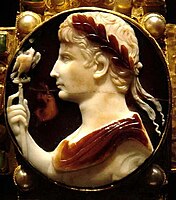Bedtime Stories #9.

Those Roman Women!
(From “History of Rome” ; Theodore Mommsen)
An equally characteristic feature of this period was the emancipation of women. In an economic point of view the women had long since made themselves independent; in the present epoch we even meet with solicitors acting specially for women, who officiously lend their aid to solitary rich ladies in the management of their property and their lawsuits, make an impression on them by their knowledge of business and law, and thereby procure for themselves ampler perquisites and legacies than other loungers on the exchange.
Ode to Women’s beauty.
Speechless and numb, I gazed on her beauty there,
Her limbs, her hands, her soft flowing hair.
Her voice the whisper of an angel’s prayer..
SHE..roamed her eyes over the banquet fair,
The roasts, the salads, the fruits so rare,
And of my adoration, just so….au contraire.
“There is so much beauty before us here ,
It is so hard to decide….you tell me, my dear,”..
She said..
”What to you is the most desirous fare?”
But it was not merely from the economic guardianship of father or husband that women felt themselves emancipated. Love-intrigues of all sorts were constantly in progress. The ballet-dancers (-mimae-) were quite a match for those of the present day in the variety of their pursuits and the skill with which they followed them out; their primadonnas, Cytheris (Volumnia Cytheris was an Ancient Roman actress and mimae dancer). and the like, populate even the pages of history.
But their, as it were, licensed trade was very materially injured by the free art of the ladies of aristocratic circles. Liaisons in the first houses had become so frequent, that only a scandal altogether exceptional could make them the subject of special talk; a judicial interference seemed now almost ridiculous. An unparalleled scandal, such as Publius Clodius produced in 693 at the women’s festival in the house of the Pontifex Maximus (Julius Caesar at that time..hence his divorce from his wife, claiming that now famous line ; “Ceasar’s wife must be above even suspicion”), although a thousand times worse than the occurrences which fifty years before had led to a series of capital sentences, passed almost without investigation and wholly without punishment.
The twist of the knife.
“ ‘Twas the cruel hand of fate”, some will attest,
“Plain bad luck..had to give it best”.
No plot nor plan nor Nemesis,
That loss of life, fortune..no redress.
There was that time for just the smile,
Luck, sweet mistress, walk a mile,
Friends, well wishes, oh wilful guile,
Was jealous intent? or blunt revile!
Chance will intervene yet awhile,
To arm the hand, repay the slight,
Fate; cruel mistress will plunge the knife,
Yes..Fate’s deft hand..would repay it best,
But truly I say ; ” ‘tis the twisting of the blade,
Gives most pleasure…
Above ALL the rest ”
The watering-place season–in April, when political business was suspended and the world of quality congregated in Baiae and Puteoli (Naples)–derived its chief charm from the relations licit and illicit which, along with music and song and elegant breakfasts on board or on shore, enlivened the gondola voyages. There the ladies held absolute sway; but they were by no means content with this domain which rightfully belonged to them; they also acted as politicians, appeared in party conferences, and took part with their money and their intrigues in the wild coterie-doings of the time.
Any one who beheld these female statesmen performing on the stage of Scipio and Cato and saw at their side the young fop–as with smooth chin, delicate voice, and mincing gait, with headdress and neckerchiefs, frilled robe, and women’s sandals he copied the loose courtesan– might well have a horror of the unnatural world, in which the sexes seemed as though they wished to change parts.
A Cold, Cruel Dream.
I dreamt she’d died, unsatisfied..
And our children asked me to attend the rite.
And though divorced these many years,
Would I please to view her in state?
Now that, is not something I’d normally do,
The plastic presentation of death I eschew.
But curiosity urged me abide ,
To view that woman I’ve many years evade.
As I gazed on the broad, Irish face,
That had lied and cheated from my embrace,
I blanched at the look of innocence there,
Rose blossoms dappling her now grey hair.
As if to deny to me by this final sight ,
The justice for many years that was my right.
Forgiveness not what I sought,
But rather admission for the damage wrought.
Upon marriage, relationship and our children begot.
But now, in the silence of this final place,
No word from those lips so bitter she’d trace,
No reason, no ’scuse, no thought of disgrace.
Just an emptiness , as per her usual escape.
Nothing..save one long-stemmed rose strategically placed,
HER request, no doubt….sensitive to an image she’d like embraced,
Always keen to leave an impression entranced…
Enough!
I turned to go…then..in a moment inspired ,
I took that rose there so astutely attired,
Broke off part of the stem.. and did place
The thorny stalk, it’s vicious spikes,
Across those tight, pressed lips now forever chaste.
What ideas as to divorce prevailed in the circles of the aristocracy may be discernedin the conduct of their best and most moral hero Marcus Cato, who did not hesitate to separate from his wife at the request of a friend desirous to marry her, and as little scrupled on the death of this friend to marry the same wife a second time. Celibacy and childlessness became more and more common, especially among the upper classes. While among these marriage had for long been regarded as a burden which people took upon them at the best in the public interest, we now encounter even in Cato and those who shared Cato’s sentiments the maxim to which Polybius a century before traced the decay of Hellas, that it is the duty of a citizen to keep great wealth together and therefore not to beget too many children. Where were the times, when the designation “children-producer” (-proletarius-) had been a term of honour for the Roman?
Loss.
Into the fire she did cast,
Letter by letter until the last.
Her stern face, flame-lit aglow,
No pity nor sentiment did it show.
No regret, nor heartfelt loss,
As letter by letter she did toss.
Until the last in hesitant hold,
One short sentence writ in bold,
One final line that caught her eye,
And though the rest she did despise,
That one broken promise with love’s death,
Gave pause for memory’s catch of breath,
Forgotten above this, all the rest;
“Forever my Love, my love, to you,
I do bequeath”.
Time now, my little chickadees to sign off on both Roman Women and the day…night-night my little ones…
Joni Mitchell… “The Circle Game”.. https://www.youtube.com/watch?v=V9VoLCO-d6U











